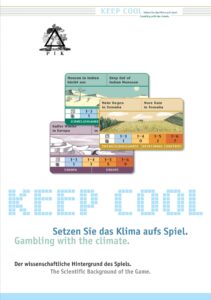Authors
and inventors of KEEP COOL
Gerhard Petschel-Held (1964-2005) was head of the Integrated Systems Analysis Department at the Potsdam Institute for Climate Impact Research (PIK) in Germany. He had a PhD in physics and worked on the integration of natural and social sciences at PIK. He is the author of more than 50 scientific papers. He served at international advisory boards on ecosystem services and human wellbeing (Millennium Ecosystem Assessment) and on climate change (IPCC).
Klaus Eisenack is a professor for resource economics at Humboldt-Universität zu Berlin. Before, he was professor for economics at Carl von Ossietzky University Oldenburg, Germany, and worked for several years at PIK. His research interests are adaptation to climate change, the energy transition and new patterns of cooperation to address global environmental change. He is particularly interested in the co-evolution of resources and institutions. He studied mathematics, economics and philosophy and has been developing board- and role-playing games since his early days.
Scientific booklet
 To explain the scientific background of the game for the broad public, a booklet has been developed at the Potsdam Institute for Climate Impact Research (PIK). It is part of the game box and is downloadable for free.
To explain the scientific background of the game for the broad public, a booklet has been developed at the Potsdam Institute for Climate Impact Research (PIK). It is part of the game box and is downloadable for free.
Science and Games
You might ask why scientists have tried to develop a board game. Scientists ask questions and try to find systematic answers to them. At the beginning of game development, focus was placed on the following three questions.
- Is it possible to simplify complex issues, such as climate, climate change and climate protection to their core components, so that they can be conveyed and analyzed in a simple way?
- Is it possible to develop an attractive and exciting board game based on these simplifications? Can such a game be successfully used for education?
- Can a simulation game be used as an “interactive model” of reality to contribute to scientific research on climate change?
Theses questions are not only driven by curiosity, but are highly relevant both for research and society. The issue of climate change needs interaction between science and policy. The game is intended to contribute to such an interaction.
Partners
Many organisations have helped to develop KEEP COOL and spread the word during the last years:
Potsdam-Institut für Klimafolgenforschung (PIK)
Tyndall Centre for Climate Change Research
Bundesministerium für Umwelt, Naturschutz und Reaktorsicherheit (BMU)
Global Climate Forum (GCF)
Carl von Ossietzky Universität Oldenburg
Leibniz Gemeinschaft
Verlag Spieltrieb
Deutsche Bundesstiftung Umwelt
Eduversum / Lehrer-Online
ECOVISIO
We thank our partners which enabled the last edition of the KEEP COOL board game:
Synagieren – Initiative für gemeinsames Handeln
Carl von Ossietzky Universität Oldenburg
Tyndall Centre for Climate Change Research
Schlaues Haus Oldenburg
Klimahaus Bremerhaven
Deutsche Umweltstiftung
Germanwatch
Potsdam-Institut für Klimafolgenforschung (PIK)
Neumarkter Lammsbräu
Organisations interested in new common projects or other forms of cooperation are invited to contact us anytime.






